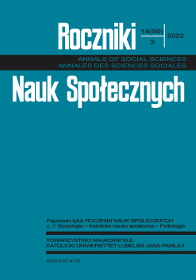A Young Man Does Not Smell Contemporary: On Portraying Characters in Jan Komasa’s Film Based on ‘Corpus Christi’, ‘Warsaw 44’ and ‘Suicide Room’
Abstract
The purpose of this article is to show the genre continuity of portraiture in the next medium and to identify its new features and elements based on three pictures directed by Jan Komasa: Corpus Christi, Warsaw 44, and Suicide Room. The research used content analysis, comparative analysis, and analysis of the structure of the film work. The semantic trend indicating the importance of portrayal in the film was also used. The above analysis showed that film portraiture based on elements of film language still has much in common with classical painting or photographic portraiture. It characterizes the protagonist, his likeness, and description, and at the same time, the action of the film is a dramatic element. The way it is used reinforces the aesthetic and genre style of the film story, and portraits are not only a registration of the character's image but have artistic functions.
References
Arnheim R. (1961), Film jako sztuka, Warszawa: Wydawnictwa Artystyczne i Filmowe.
Balázs B. (1957), O twarzy człowieka, [w:] B. Balázs, Wybór pism, wybór i oprac. A. Jackiewicz, tłum. R. Porges, K. Jung, Warszawa: Filmowa Agencja Wydawnicza.
Berelson B. (1952), Content analysis in communication research, New York: Free Press.
Boleslavsky R. (1949), Acting: The first six lessons, New York: Theatre Arts Books.
Burzyński R. (1985), Portret fotograficzny, Warszawa: Wydawnictwa Artystyczne i Filmowe.
Gombrich E.H. (1999), O sztuce, Wrocław: Arkady.
Haake M.P. (2008), Portret w malarstwie polskim u progu nowoczesności, Kraków: Avalon.
Helman A. (1971), O filmowym aktorstwie wczoraj i dziś, Kino, nr 7, s. 36-38.
Helman A. (red.) (1972), Estetyka i film, Warszawa: Wydawnictwa Artystyczne i Filmowe.
Hendrykowski M. (2014), Semiotyka twarzy. Prolegomena, Przegląd Kulturoznawczy, nr 1-2, s. 200-213.
Holsti O.R. (1969), Content Analysis for Social Science and Humanities, Reading, Massachusetts: Addison Wesley Pub. Co.
Jarosz M. (2004), Nastała era aromatyczna, https://naukawpolsce.pl/aktualnosci/news%2C17660%2Cnastala-era-aromatyczna.html
Krajewski M. (2005), Kultury kultury popularnej, Poznań: Wydawnictwo Naukowe UAM.
Krippendorff K. (2004), Content Analysis: An Introduction to Its Methodology, 2nd ed., Thousand Oaks, CA: Sage.
Kubalska-Sulkiewicz K., Bielska-Łach M., Manteuffel-Szarota A., Kardasz M. (red.) (2003), Słownik terminologiczny sztuk pięknych, wyd. 4, Warszawa: Wydawnictwo Naukowe PWN.
Lèger F. (2002), Malarstwo i kino, [w:] A. Gwóźdź (red.), Europejskie manifesty kina. Antologia, Warszawa: Wiedza Powszechna, s. 179-180.
Lellis G. (2001), Portret w filmie, wideo i internecie. Kilka aksjomatów, porównań, przykładów, Kwartalnik Filmowy, nr 35/36, s. 133-143.
Lellis G. (2000), Portraiture in film, video, and Internet: some axioms, comparisons and examples, Art. Inquiry, t. 2, s. 75-87.
Lisowska-Magdziarz M. (2004), Analiza zawartości mediów. Przewodnik dla studentów, Kraków: Uniwersytet Jagielloński.
Maciejewska M. (2020), Młoda Polska. O filmach Jana Komasy, Ekrany, nr 2 (54), http://ekrany.org.pl/kino_wspolczesne/mloda-polska-o-filmach-jana-komasy/
Madej A. (1994), Człowiek wyrazisty, Kwartalnik Filmowy, nr 5, s. 131-154.
Neuendorf K.A. (2017), The Content Analysis Guidebook, 2nd ed., Thousand Oaks, CA: Sage.
Pisarek W. (1983), Analiza zawartości prasy, Kraków: Ośrodek Badań Prasoznawczych.
Płażewski J. (2008), Język filmu, Warszawa: Książka i Wiedza.
Seneca L.A. (1971), Naturales Quaestiones, Book 1, Cambridge, Mass.: Harvard University Press.
Witkiewicz S. (2002), Fotografia i malarstwo, [w:] M. Hopfinger (red.), Nowe media w komunikacji społecznej w XX wieku. Antologia, Warszawa: Oficyna Naukowa, s. 40-44.
Witz I. (1970), Portret w malarstwie, Warszawa: Państwowe Zakłady Wydawnictw Szkolnych.
Zarębski K.J. (2011), Jan Komasa, https://culture.pl/pl/tworca/jan-komasa
Zuffi S. (2001), Historia portretu. Przez sztukę do wieczności, Warszawa: Wydawnictwo Arkady.
Copyright (c) 2022 Roczniki Nauk Społecznych

This work is licensed under a Creative Commons Attribution-NonCommercial-NoDerivatives 4.0 International License.


